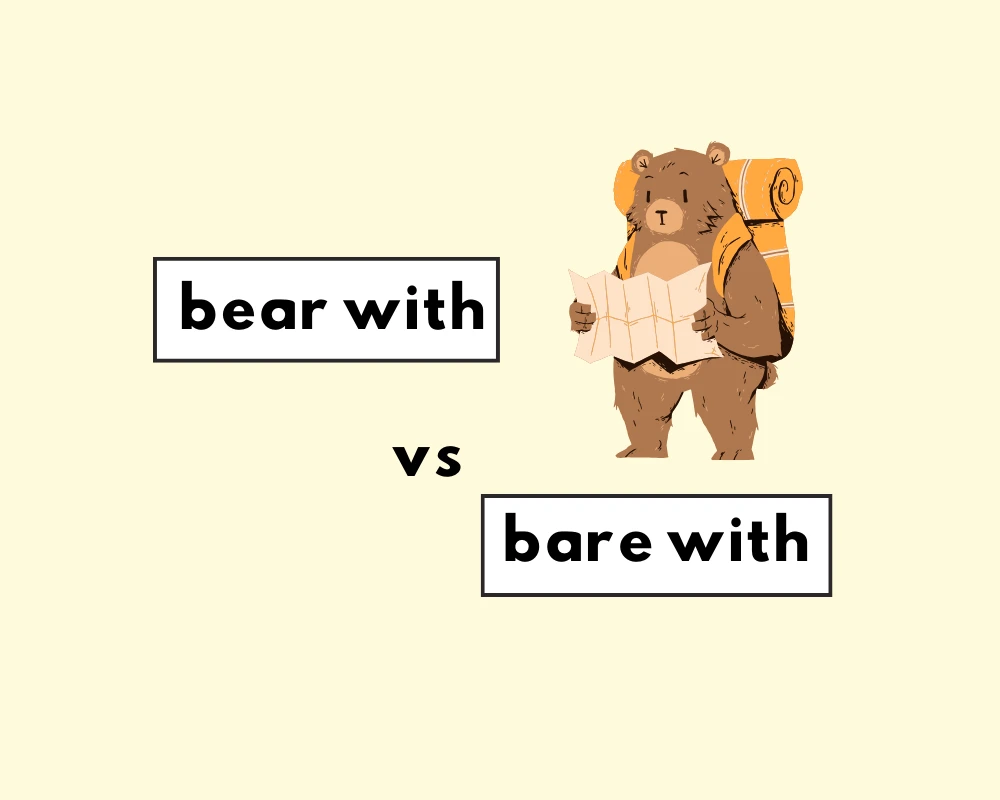Contents
Toggle
‘Bare with me’ or ‘bear with me’
Also known as the difference between asking someone if they’re naked, or politely asking them to be patient while you figure something out.
Don’t screw this one up, folks! Keep reading to learn how to use the phrases bear with me vs. bare with me.
“Bare with” or “bear with”
| Examples with the verb “bear” | Examples with “bare” |
| I can’t bear seeing you cry. | I opened the box with my bare hands. |
Bear can be a noun or a verb: the former refers to the wild animal and bear, such as the Grizzly or Polar Bear. The latter means to endure or tolerate something usually unpleasant. This is the correct spelling and meaning of the phrase “bear with me“, and adjacent phrases that use the verb form of ‘bear’ (e.g., “bear in mind”).
Something (or someone) that’s bare, on the other hand, is uncovered or empty (‘the fridge was completely bare‘). In other words, ‘bare’ is an adjective, whereas ‘bear’ is mostly a verb.
Note: something that’s “bare” can also describe something as basic or essential, as we see in the popular phrase, the bare necessities.
“Bare” / “bear”, used in sentences
| Sentences with the adjective bare |
She likes to walk around in bare feet. The windows looked out onto a bare field. The walls were bare except for a clock. |
| Sentences with the verb bear |
She couldn’t bear the thought of losing him. We could hardly bear to be outdoors in the blinding sunlight. How can you bear this awful noise? |
In review: bear vs. bare
Though we spell and pronounce it the same as the noun, aka the Grizzly bear, they are evidently distinct in meaning.
Bear is mostly a verb that means to have to endure or carry the burden of something that’s usually difficult/unpleasant; “to be able to accept and deal with something unpleasant”, as the online dictionary states.
If you have trouble remembering the correct word, try to associate ‘bear’ with the wild animal; whereas, “bare” is similar to “basic”, and also starts with the letters ‘b’ and ‘a’.
Phrases with bear and bare
| Phrases with “bear” | Meaning |
|---|---|
| to bear arms | to carry a gun or a weapon |
| to bear a resemblance | to look similar to someone |
| as busy as a hibernating bear | meaning not busy |
| Phrases with bare | Meaning |
|---|---|
| bare bones | Meaning meaning only the essentials or minimum of something. |
| bare necessities | To have only what is needed or necessary; just enough or sufficient. |
| bare naked | Meaning nude; naked. |
| bare minimum | To do the smallest or least amount possible. |
| to bare one’s breasts | To leave yourself open or vulnerable to something/someone. |
| to bare one’s teeth | To display anger or a threatening reaction to something/someone. |
Read about other confusing words
Sources
- Bare, Oxford Learner’s Dictionary, accessed on Oct 4, 2023.
- Bear, Oxford Learner’s Dictionary, accessed on Oct 4, 2023.
- Wikipedia contributors. “Grizzly bear.” Wikipedia, The Free Encyclopedia. Wikipedia, The Free Encyclopedia, 29 Jan. 2024. Web. 31 Jan. 2024.
- Idioms with bare, The Free Dictionary










